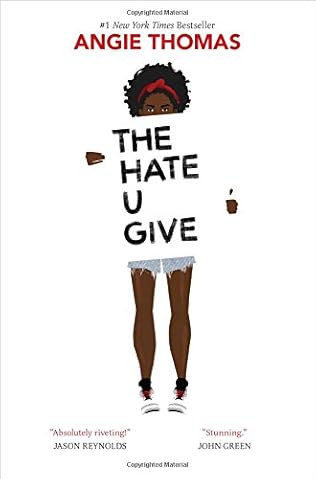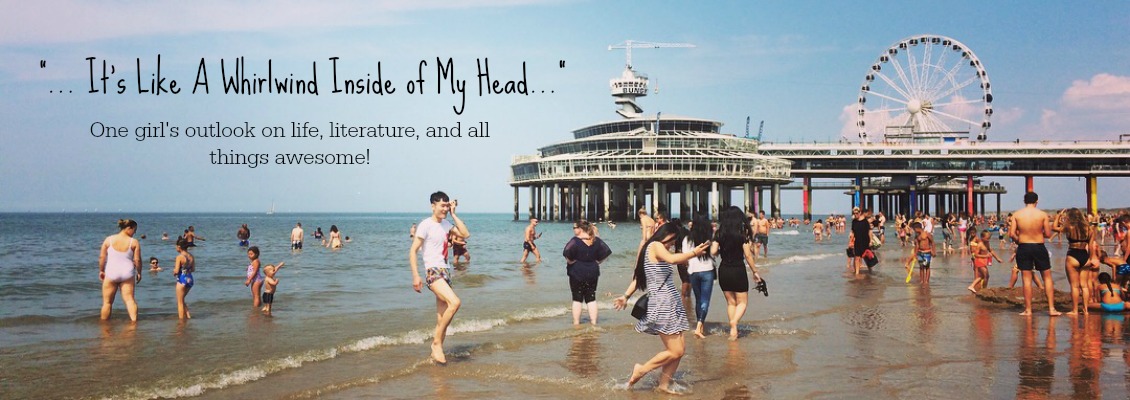 "Sixteen-year-old Starr Carter moves between two worlds: the poor neighborhood where she lives and the fancy suburban prep school she attends. The uneasy balance between these worlds is shattered when Starr witnesses the fatal shooting of her childhood best friend Khalil at the hands of a police officer. Khalil was unarmed.
"Sixteen-year-old Starr Carter moves between two worlds: the poor neighborhood where she lives and the fancy suburban prep school she attends. The uneasy balance between these worlds is shattered when Starr witnesses the fatal shooting of her childhood best friend Khalil at the hands of a police officer. Khalil was unarmed.Soon afterward, his death is a national headline. Some are calling him a thug, maybe even a drug dealer and gangbanger. Protesters are taking to the streets in Khalil's name. Some cops and the local drug lord try to intimidate Starr and her family. What everyone wants to know is: what really went down that night? And the only person alive who can answer that is Starr.
But what Starr does or does not say could upend her community. It could also endanger her life."
I read this book over the summer when reading lists from the library for teens and other young readers are out. I saw this book on those lists for several weeks and then I started hearing the great reviews and I knew I had to read this book for myself, especially in the light of the court decision of former Officer Yanez and Philando Castille. There's so much around this decision that is confusing and angering. This book was published in February 2017 and it couldn't have come at a better time as we're all trying to understand and sort out what exactly is going on in our criminal justice system (or perhaps more accurately: how to fix it, because I think the problem is quite clear).
I've been trying to read more books about race and police brutality and all of the nonfiction texts I've tried reading (I'm still trying to work my way through them) just don't have a certain power that fiction possesses. Even though Starr is not a real person and her childhood friend Khalil is not a real person who was actually killed, fiction has a way of letting us see what exactly it's like in a situation where you fear for your life because of someone in power with a deadly weapon and because of the color of skin you happen to have been born with. You're put in the middle of a situation where you can begin to understand what it's like to be affected by trauma such as this and you can see how a community genuinely feels and handles a situation like this. At the very least, fiction gives you experiences that you might not have otherwise. Experience brings a certain level of understanding and certainly empathy if nothing else.
As well as giving the reader the experience they might be lacking in a real situation like this, this book also gives you an insight into how POC code switch in different areas of their lives. One of the most fascinating college courses I ever took was a class called "Language as Power" which is just another way we can wield privilege over others. Due to the fact that I speak and write in more or less "proper" grammar (at least the more accepted way of speaking), I am more likely to be taken seriously by others in official situations, I am more likely to be accepted when I apply for housing and for a job than other people who don't speak the way I do. Therefore, for those who don't speak the way I do at home, codeswitching is a necessary evil. Starr talks about how there are almost two of her: the Starr she presents at her majority white school and the Starr that she is at home. She not only speaks differently, but she acts differently in some ways too. I think it really puts this in focus of just how we tend to stifle people of color (not just those who identify as black or African American, but all POC) in our society.
I could go on and on about this book, but for the sake of clarity, I will pause things here. If anyone is interested in continuing this conversation, we can talk about this in the comments below (or in person if you already know me). This is such an important read. Now that I'm a teacher, I made sure I got two copies for my students. They need more characters like Starr speaking to their experience or the experiences of their communities. Do whatever you need to do to get your hands on this book.
I give 'The Hate U Give':
Thanks for Reading!
--Jude


No comments:
Post a Comment
I love your comments! Comment away!